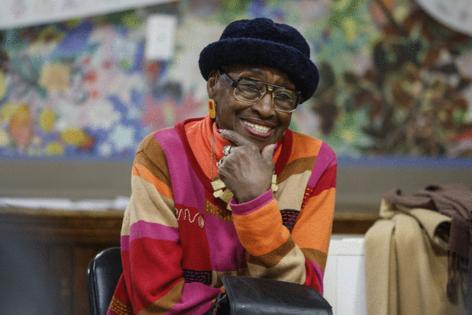Column: Her son committed murder and ruined lives. Now she's won an award for helping families rebuild theirs
Published in Lifestyles
Virginia Wyne Hammond, a family therapist, was living a contented family life. Her work ethic had brought her professional and personal success. Her long marriage to Wade Hammond III, a Philadelphia schoolteacher and former police officer, was peaceful. In 1977, they moved from West Philadelphia to Bryn Mawr and sent their two sons to Haverford High School for a high-quality education.
For decades, the Hammonds had slowly knitted together their American dream. But on the evening of Nov. 6, 1997, it all unraveled.
That’s when Hammond’s eldest son, Christopher Wade Hammond, walked into an Upper Merion Dunkin’ on DeKalb Pike, intent on robbing the store. A fight broke out, and Christopher Hammond murdered Chandrakant Patel, 64, the night manager who tried to stop him. Christopher Hammond, who was 22 at the time, fled to Ohio and was eventually caught. He confessed and is now serving a life sentence for first-degree murder.
It was from that horror that Virginia Hammond slowly rebuilt a new volunteer effort: helping families of incarcerated people and those reentering society. In November, she received the Pennsylvania Prison Society’s 2024 Volunteer of the Year award.
“My goal is to be available, to be supportive, to be helpful,” said Hammond, 85.
In the beginning
To the world, Christopher Hammond was a convicted murder. The media called him the doughnut-shop killer; prosecutors called him a vicious drug-fueled predator. To the Patel family, he was the man who ruthlessly took the life of a joyous husband of 40 years, a father of four and grandfather of seven, who immigrated to the United States to help create a better life for his extended family.
Virginia Hammond lowered herself onto an ottoman in the plant-filled living room of her home to tell The Inquirer another version of her son.
“He was a talented young man. He was a scholar. He was in the advanced class at Haverford High. He was also well-liked with an active social and athletic life,” she said, adding that he had an IQ of 140.
Wade Hammond, an active father, had gotten both of his sons involved in ice hockey. By the time Christopher Hammond was graduating from high school, he wanted to play at the collegiate level, and the only position he wanted was goalie. The University of North Dakota offered him an ice hockey scholarship.
“We packed up the van and Wade drove from here to the University of North Dakota. I thought everything was fine that first year. I would send him his allowance and we would chitchat [on the phone].”
But Christopher Hammond was far from fine.
It all falls apart
Today, Virginia Hammond thinks sending him so far away from home when he was only 17 years old was a mistake. “We didn’t consider the downside — loneliness, being isolated. That’s when he got into the drugs,” Hammond said. Her son’s drug of choice was heroin.
“He came home at the end of that semester, and it was just one thing after another,” she recalled. Despite his parents supporting him through five bouts of rehab, Christopher Hammond couldn’t kick his drug habit. “He would have four to five months of OK-ism, and then something would happen.”
That “something” was always answered by doing drugs again.
By the day of the murder, Christopher Hammond had been kicked out of his family home and fired from a job at a Petco store he had held for only two weeks. Desperate for cash, he went to the Petco looking for his last paycheck. When it wasn’t available, he went across the street to rob the Dunkin’.
He walked out with $286 in cash but left two families in emotional ruin.
Using personal pain to help others
Christopher Hammond was first incarcerated at State Correctional Institution (SCI) Albion in Erie County, a six-hour drive from Bryn Mawr. For his mother, who wanted to visit monthly, it was too far to drive herself, and a despairing Wade Hammond uncharacteristically refused to drive, adamantly disagreeing with his wife about regular visits. He would visit only once a year.
“I understand his devastation, I really do. He broke down and cried, and I don’t think he ever recovered,” said Hammond of her husband, who died in 2019.
That’s when Hammond came to the Pennsylvania Prison Society, looking for help.
The organization, founded in 1786 to help ensure the well-being of incarcerated people, offered bus transportation — a service that has since been suspended — from the city to different prisons. She understood the stigma and disappointment that families of incarcerated people experience. During the long bus rides, she would lend an ear to whoever needed it.
From this informal bus captain role, her volunteer work grew. She is now a member of the Prison Society’s Community Advisory Council as well as a mentoring program where she tries to ease the stressors of reentry.
“Anything they want, I will do,” Hammond said. The Prison Society has “done so much for me in so many ways. When I needed it, they were the ones that made the difference.”
“I feel like Virginia is the embodiment of a warm hug,” explained Kirstin Cornnell, family and community support director for the Pennsylvania Prison Society. “So much of this work is so heavy. The issues feel insurmountable. Having her ever-present sense of joy and levity helps, and I admire her ability to channel that and share it with others.”
©2025 The Philadelphia Inquirer, LLC. Visit at inquirer.com. Distributed by Tribune Content Agency, LLC.
























Comments